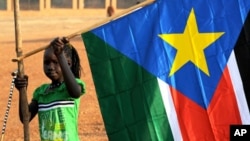Tensions are rising in Sudan ahead of the official separation of Africa's largest nation into separate countries. Many issues - citizenship, border disputes, oil revenues, internal clashes - still remain unresolved. This raises questions about whether solutions can be found before South Sudan officially declares its independence on July 9.
About 100 young people gathered recently in Juba to discuss South Sudan's upcoming independence. They used drawings and poems to express how they would improve life in their new nation.
"I will add more schools to the already built schools by (Southern Sudan President) Salva Kiir, and hospitals. I will also help the poor by providing them with shelter," said participant Sumaya Ismail.
But two months before the official birth of what would be the newest African country, a number of issues remain unresolved. Johnnie Carson is the U.S. Assistant Secretary of State for African Affairs. "A political resolution on the Abyei situation is absolutely essential and so is the resolution of the issue of wealth sharing and oil, as is the issue of demarcation and delimitation of boundaries in five different spots along the north-south boundaries, the issue of citizenship," he said.
The U.N. reports that 800 people have died in internal clashes since January 9, when voters in southern Sudan decided on independence. In a radio interview, South Sudan Vice President Riek Machar accuses the military in the north of arming militias in the south - an accusation the north denies. "It is the military intelligence that gives arms to groups that say they are against the government of Southern Sudan and I am hoping by the 9th of July, these should be stopped because they’ll be supporting insurgencies," he said.
Sudanese President Omar al-Bashir said recently his government will not recognize South Sudan as an independent state if it claims the contested region of Abyei. His warning follows the circulation of a draft constitution for South Sudan claiming Abyei as part of its territory.
Abyei is home to both the indigenous southern Ngok Dinka people and the northern Misseriya, who rely on Abyei as grazing land for their cattle. The region also contains significant oil deposits. Under a comprehensive peace agreement signed in 2005, Abyei's future with either north or south is supposed to be determined by a still-unscheduled referendum.
While in Washington, Justice Chan Reec Madut, chairman of the Southern Sudan Referendum Bureau, praised Mr. Bashir for his support of southern independence. He also says problems are being addressed. "The violence happening in the south is restricted to very few areas and I believe the government of South Sudan is in a position to address the issue. On Abyei, it’s a political issue at this point of time. The ruling party - NCP and the SPLM in the south - have committees which are addressing the issue of Abyei among other outstanding issues including citizenship," he said.
But for Abyei specifically, time is running out. "We are left with only May and June and if you see the situation you cannot be sure if this issue will be addressed before July 9th," he said.
Whatever the outcome, Ambassador Carson offers this advice. "These are two states that are very much in the same boat. If one falls over, it’s likely that the other one would also fall over. We want to see a South Sudan that is strong and stable and we want to see a north Sudan that is also strong, democratic and stable and economically growing," he said.
He says America wants strong relations with both north and south, Juba and Khartoum.




